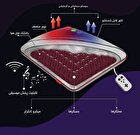Iranian University Researchers Produce Phosphatic Fertilizer from Sludge

“Struvite in the presence of biochar as a slow- release phosphate fertilizer from wastewater” is the title of a post-doctoral research conducted by researcher Marziyeh Piri under supervision of Ebrahim Sepehr at Urmia University and was sponsored by Iran National Science Foundation (INSF).
Biochar is a carbon-enriched biomaterial generated by combustion of the biomass through a process called pyrolysis. Phosphorus such as struvite is used as a fertilizer in soils because it contains some of the major nutrients.
“Studies have showen that urban wastewater contains a large amount of phosphorus which is removed in treatment plants before releasing the wastewater into the environment given the irreparable effects of phosphorus on the surface waters through the enrichment process,” said Piri, who has a PhD from Urmia University in soil science.
“Due to the limited resources of phosphate rock in the world, recycling phosphorus from wastewater to produce phosphate fertilizer is a promising path. Struvite crystal mineral is one of the poorly soluble phosphorus minerals, which contains three essential plant nutrients, including nitrogen, phosphorus and magnesium,” she added.
“Since this phosphorus fertilizer has low solubility, this fertilizer is considered a slow-release fertilizer in scientific sources that can gradually provide phosphorus to the plant and help to reduce wastage, stabilize it in the soil, and increase the recycling of phosphorus fertilizers in the country's soils,” the research added.
“Because the effluents are rich in phosphorus, they have to be refined before entering the environment in treatment plants after going through different processes. In recent years, in different countries in the world, special attention has been paid to the recovery of elements to produce fertilizers from unnatural sources, especially wastewater and effluents rich in phosphorus. Moreover, given the abundance of grape pruning residues in West Azarbaijan province [where Urmia University is located], converting them into biochar is an opportunity to improve fertility of the soil for the long-term use of elements,” the Urmia University researcher continued to explain.
4155/i





















